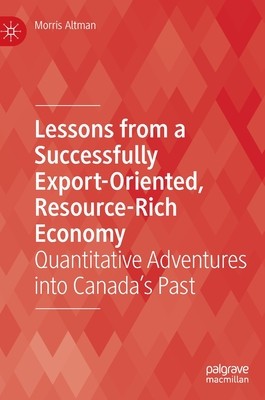
- We will send in 10–14 business days.
- Author: Morris Altman
- Publisher: Palgrave Macmillan
- Year: 2022
- Pages: 203
- ISBN-10: 303103886X
- ISBN-13: 9783031038860
- Format: 14.8 x 21 x 2.7 cm, hardcover
- Language: English
- SAVE -10% with code: EXTRA
Lessons from a Successfully Export-Oriented, Resource-Rich Economy (e-book) (used book) | bookbook.eu
Reviews
Description
A major theme of this book is that, contrary to what many experts believe, being endowed with a plenitude of natural resources is not a curse: rather it provides a potential advantage, if capitalized by the well-endowed economy. Much depends on the institutions that help frame the decision-making process that affects the process of growth and development. Canada is an example of a successful export-oriented economy. And, its export-orientation has been a focal point of discussion and debate, going way back to discussions of the early fur trade, the fishing industry, wheat farming, and mining and oil and gas exploration. Unlike other economies well-endowed with natural resources, Canada does not appear to be at all cursed, but rather blessed with natural resource abundance. This book, which ranges from the late seventeenth to the early twentieth century, provides insights from Canadian economic history on how such abundance can be a handmaiden of successful growth and development. From this perspective, the natural resource curse appears to be more of a 'man-made' phenomenon than anything else. This book also investigates aspects of gender inequality in Canada as well as the evolution of hours worked as it intersects with worker preferences and 'market forces'. The narratives in this book are contextualised by the construction of new or significantly revised data sets, which speaks to the importance of data construction to robust economic analysis and economic history.
EXTRA 10 % discount with code: EXTRA
The promotion ends in 20d.10:00:40
The discount code is valid when purchasing from 10 €. Discounts do not stack.
- Author: Morris Altman
- Publisher: Palgrave Macmillan
- Year: 2022
- Pages: 203
- ISBN-10: 303103886X
- ISBN-13: 9783031038860
- Format: 14.8 x 21 x 2.7 cm, hardcover
- Language: English English
A major theme of this book is that, contrary to what many experts believe, being endowed with a plenitude of natural resources is not a curse: rather it provides a potential advantage, if capitalized by the well-endowed economy. Much depends on the institutions that help frame the decision-making process that affects the process of growth and development. Canada is an example of a successful export-oriented economy. And, its export-orientation has been a focal point of discussion and debate, going way back to discussions of the early fur trade, the fishing industry, wheat farming, and mining and oil and gas exploration. Unlike other economies well-endowed with natural resources, Canada does not appear to be at all cursed, but rather blessed with natural resource abundance. This book, which ranges from the late seventeenth to the early twentieth century, provides insights from Canadian economic history on how such abundance can be a handmaiden of successful growth and development. From this perspective, the natural resource curse appears to be more of a 'man-made' phenomenon than anything else. This book also investigates aspects of gender inequality in Canada as well as the evolution of hours worked as it intersects with worker preferences and 'market forces'. The narratives in this book are contextualised by the construction of new or significantly revised data sets, which speaks to the importance of data construction to robust economic analysis and economic history.


Reviews